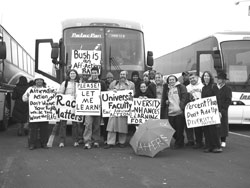Rallying at the Supreme Court for Affirmative Action
On April 1, 2003, nearly 40 TC students, staff and faculty members took a bus to Washington, D.C., for a rally before the U.S. Supreme Court to support affirmative action in higher education admissions. The rally attracted tens of thousands of people from across the country, with contingents from many universities, including Columbia (which had six buses), Harvard, Howard, Rutgers, Boston College and the University of Michigan, various civil rights organizations, numerous churches, and several high school groups.
Published Saturday, Apr. 2, 2005
